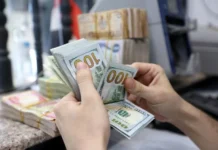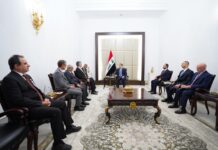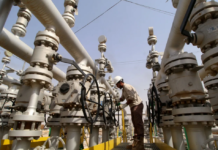Clare: Urgent… The House of Representatives extends its legislative term by 30 days
5/9/2024
The Presidency of the House of Representatives decided to extend the current legislative term for a period of 30 days
The Parliamentary Finance Committee had previously expected an extension of the legislative term with the imminent arrival of the budget schedules to the House of Representatives.
There is also a political movement to elect a new speaker of the House of Representatives, which requires the continuation of Parliament’s work. LINK
DCDriver: Don’t recall them ever extending sessions for that long IMO. Interesting
DeepWoodz: I for one am glad for this news. Authority or not, they need to play their part. Iraq is all out of excuses for not releasing a “worth more than a dollar” rate. They have been making fools of all the gurus up to this point. We all know this should have been finished years ago.
DMcCall: Many felt disappointment about the lack of confirmation regarding the status of Iraq’s WTO membership. I too felt some frustration.
I felt May 9th had some value. I tried to find reliable information but drew a blank.
I personally felt that a lack of information didn’t change what Frank told us some time back, and told us tonight. The requirements were met, period. The rate doesn’t have to be exposed to receive all the advantages of being a member.
As many reasons there are to make the change right now, there are reasons that this is taking this time frame.
They are at a crossroads in time. And quite frankly, they can go in any direction. Their citizens are ready to enjoy what they see the UAE is enjoying. They want to enjoy what Saudi Arabia is enjoying, and others.
************
Clare: {Al-Furat News} publishes the text of Al-Sudani’s request to Guterres to end UNAMI’s work in Iraq
5/10/2024
the request of the Prime Minister, Muhammad Shiaa Al-Sudani, to the Secretary-General of the United Nations, Antonio Guterres, to permanently end the work of the United Nations mission in Iraq.
“the justifications for the presence of a political mission in Iraq are no longer available, especially after more than 20 years have passed since the democratic transition and overcoming great and diverse challenges.” LINK
Deep Woodz: I don’t know about y’all but I’m loving this! First Plaschart and now Guterres. LEAVE ALREADY!
************
Clare: Floating the dinar” returns to the forefront.. Will the Central Bank of Iraq resort to it and what are its risks?
5/9/2024
From time to time, calls for floating the Iraqi dinar float on the surface of the Iraqi financial market, in order to bridge the gap between the prices of the dinar and the dollar, and these calls meet every time they return to the forefront, with supporters who see it as saving the Iraqi economy, and opponents who see it as the most dangerous stage that Iraq will pass through because of its Of risks to his economy.
Floating currencies is known as liberating the exchange rate of the currency, so that it becomes completely liberated, so the government or central banks do not interfere in determining its value directly, but rather it is automatically sorted into the currency market through the supply and demand mechanism that allows determining the exchange rate of the national currency against foreign currencies.
Critical vision
Financial expert Safwan Qusay said in an interview with Al-Ahed News, “The Central Bank of Iraq adopted a fixed price policy, that is, so that every dollar became equal to 1,320 dinars, and there are calls to release the price and not fix it at a specific rate. This means that demand and supply are what determine the exchange price.” “.
He added that “the measure, in light of the absence of economic diversification, will harm the Iraqi market and will reflect negatively on economic stability,” noting the necessity of “diversifying the economy first and then liberalizing the fixed price later and providing a basket of different currencies for the exports of different countries.”
Qusay stated, “We can have a price that is proportional to export, supply, demand, need, processing, and consumption, as such measures are far from the Iraqi economy,” considering that “activating flotation will create a market of speculation that cannot be controlled.”
In turn, financial expert Saif Al-Halafi saw the necessity of “supporting the Iraqi dinar instead of floating, but in a way closer to the language of floating.”
He explained in an interview with Al-Ahed News, “There is a possibility for the central bank to follow the same mechanisms as the American Federal Bank. Strengthening the dollar in the market is determined by the American Federal Reserve, and it depends on the market mechanisms of supply and demand.
Therefore, the Central Bank of Iraq and its law allow the strengthening of the dinar, because Monetary policy is under his authority and he is responsible for the value of the dinar against the dollar.”
Al-Halafi notes, “Raising the value of the dinar against the dollar will put the government before another test, which is raising the value of the dinar again to protect the citizen from rising prices,” adding, “This incident occurred when Iraq fixed the price of the dollar at 1,320 dinars, and it was compensated by the export of goods in a manner Huge waves from neighboring countries to Iraq, and the government and the central bank took responsibility for controlling the dollar.”
He points out the possibility that “there will be two exchange rates for the dollar against the dinar and it will change according to the actual need of the daily situation,” explaining that “the Iraqi market has two exchange rates, the first at the central bank, which is 1,320 dinars to the dollar, while the second price is the market price or the parallel price.”
He shows that “all attempts carried out by the Central Bank and the government to control and curb the parallel price have failed, and that this price emerged due to the geopolitical challenges surrounding Iraq, and the distancing of importing merchants from Iran, Syria, Russia, and other countries subject to sanctions from America, who cannot enter their goods through Transfers and credits.
Al-Halafi confirms that “raising the value of the dinar will have an advantage, as it will provide a large labor market in Iraq due to the price difference, so raising the value of the dinar’s price against the dollar, even if only slightly, will protect Iraqi workers,” pointing to “the possibility of the influx of large foreign workers due to the size of the projects.” in which the government will work.
Crazy risks
For his part, researcher in financial affairs, Nabil Al-Marsoumi, believes that “the decision to float the dinar has some economic positives, but the economy should not be taken in its abstract aspect, but rather insofar as it relates to people, especially the poor.”
The decree says in a Facebook post, “In light of Iraq’s lack of a national private sector that can contribute to increasing the supply of dollars in the market and because of the huge volume of imports, which reach 67 billion dollars annually, the only party that owns the dollar is the government.”
He adds: “If the government decides not to interfere in the exchange market, it is expected that the dinar will witness a violent collapse and rampant inflation that will cause prices to rise to insane levels that will cause severe damage to citizens’ living standards. The poor will become more miserable and will later lead to social tensions and a major rift in the social peace.”
Previous experiences
In this regard, financial expert Manar Al-Obaidi points out, “The experience of floating the currency was successful in one of the Arab countries and supported its economy positively.”
He added in an interview with Al-Ahed News, “In 2018, Morocco adopted a new monetary policy represented by what is known as the managed float policy. This policy is a combination between the fixed rate policy and the floating rate policy, through which central banks set minimum and upper limits for movement by determining the exchange rate against… currency or a group of foreign currencies, and one of these banks was the Central Bank of Morocco.”
Al-Obaidi explains, “The managed float policy aims to gradually liberalize the currency until complete liberalization of the exchange rate is achieved.
Indeed, the Central Bank of Morocco has begun to set a fluctuation range, which is known as the margin of rise or fall in the exchange rate, which initially reached 0.3%, meaning that the Central Bank is allowed to rise above the specified exchange rate.”
By 0.3% or decreasing according to supply and demand until it reached a fluctuation range of 5% in March 2020, and this policy was accompanied by a support policy represented in canceling customs tariffs on some basic materials such as food and supporting funds that support vulnerable classes.”
Al-Obaidi believes that “this policy may be a successful alternative in Iraq by following a managed float policy that controls the range of volatility and works to gradually increase it until the currency is completely liberalized,” noting that “there is no study linking inflation rates to the exchange rate.” In the parallel market, the best way to know the effect is through a deliberate experiment with a managed float of the exchange rate.”
Government advice
The Advisor to the Prime Minister for Financial Affairs, Mazhar Muhammad Saleh, had previously explained the danger of the exchange rate becoming unstable if the demands to float the dinar were achieved.
Saleh said in a statement followed by Al-Ahed News, “Calls for floating the dinar to end the gap between the official exchange rate and the parallel market may be possible in an economy in which the free market alone influences the movement of the balance of payments, and not in an economy in which the rentier government sector is dominant and generates currency reserves.”
Foreign currency, as the monetary authority alone is the main source of supply of foreign currency that meets the desired demand for foreign exchange in the money market, to provide stability in this market and achieve a desired and homogeneous exchange rate through the interventionist role played by monetary policy.
He added, “Claims for flotation mean in all cases adopting the prevailing exchange rate in the parallel market to achieve the goal of stability and balance in the official exchange rate itself at a new point reached by the market at the end of the supposed flotation policy and returning to stability again.
Also, the flotation scenario means in all cases the withdrawal of the authority.” Cash from being an essential central supply of foreign currency, to be replaced by new forces supplying foreign currency from free market makers, which only have a weak, limited supply of foreign exchange, and at the same time they carry an uncontrolled package of inflationary expectations and are called in economic literature the forces generating expectations. Inflationary
He continued, “The hypothetical new supply forces for foreign exchange adopted by the exchange market in that scenario will mean the dominance of supply forces from speculators with very limited quantities of foreign exchange available for supply in the parallel market
Matched by an open demand for foreign currency on the part of the market that undoubtedly exceeds that limited parallel supply.” of foreign exchange, perhaps by more than 10 times at least in our estimation, and such a policy of floating to achieve a homogeneous equilibrium exchange rate would be an open and perhaps unruly situation, as long as the central government supply of foreign currency would be absent from the market
And we would not then obtain any equilibrium point in the exchange rate. An exchange rate that is sought to float except with a widespread deterioration of the exchange rate as long as it is controlled by forces that generate inflationary expectations, as we noted in a highly unilateral rentier economy, and it is an exchange rate whose mechanisms will move in a market that is incomplete in terms of productivity in compensating it for the required supply of goods and services.
Saleh warned, “Then no one knows how much the new exchange rate resulting from the flotation will be, which will undoubtedly be accompanied by a prior wave of inflationary expectations, which is a dangerous wave whose directions are difficult to control, which may force monetary policy according to this floating scenario by intervening in foreign reserves.”
It is an unjustified extravagance in foreign exchange to impose a state of stability in the general level of prices again just to adopt it when exchange rates reach low rates, and no one knows how much they will reach.” LINK
***********
Deep Woodz: Talking about the float again. Frank must be right. That’s what’s coming or these guys wouldn’t be putting their two cents in. Some of what they say is true, some not.
Even Saleh commenting on not knowing where it will end is a load of crap. The CBI can start/stop, change, maneuver the rate any way they like at any time. Frank has mentioned a cap many times. OF COURSE they can do whatever they want! They are a sovereign country again. Pretending like they have no control. Gets on my nerves.
~~~~~
Paulette: IMO…..it is great to see more articles regarding the “Float”……I strongly believe this is the early stages of the last push by the CBI to educate the Citizens prior to implementing the “Delete the Zeros” project…..Patience all…..this is slowly coming together…….
Clare: WHO HAS BEEN TELLING US ABOUT A MANAGED FLOAT !!! WALKINGSTICK & FRANK…. WAY BEFORE THEY EVEN TALKED ABOUT IT IN THE ARTICLES imo
Al-Obaidi believes that “this policy may be a successful alternative in Iraq by following a managed float policy that controls the range of volatility and works to gradually increase it until the currency is completely liberalized,” noting that “there is no study linking inflation rates to the exchange rate.” In the parallel market, the best way to know the effect is through a deliberate experiment with a managed float of the exchange rate.”
~~~~~~~~~~
Clare: Post #32: The dollar is reeling from a fatal blow and there are fears of a collapse of the dinar LINK
UNDERSTAND POST #32 IS DIFFERENT OPINIONS…….
“Deputy Chairman of the Parliamentary Finance Committee, Ahmed Mazhar Al-Janabi, said {to Al-Furat News} that “the Central Bank’s decision to cancel the currency auction at the end of the year will open space for exploitation and a problem will occur. If the auction is canceled and ends, the exchange rate in the markets may double, and if the Central Bank goes towards this option, the dollar exchange will “It will reach 200 thousand dinars,” according to his opinion.”
FROM PARLIAMENT – THIS IS NOT GOING TO HAPPEN!! THEY DON’T KNOW AS MUCH AS SUDANI, ALAQ & SALEH DO!
“The Central Bank of Iraq’s cancellation of the currency {auction} window at the end of 2024”
WE KNOW THIS … SUDANI & ALAQ HAVE ALREADY AGREED WITH DC ON THIS! IT IS TRUE
Saleh stated, “As for the developments taking place in the gold commodity market or gold filigree, especially the sudden price developments therein, up and down, they are not considered an alternative directly affecting the improvement of the exchange rate because they are limited in impact and impact on the movements of the parallel exchange market, and that the main gold trade is financed as foreign trade through Transfers from the banking system and the official exchange market.
THEY (ARE) AND WILL BE ASSET BACKED…. WILL FLOAT AND THERE WILL BE A MANAGED CAP… LIKE WS & FRANK HAVE BEEN TELLING US IN THEIR OPINION.. IMO
~~~~~~~~~~
Cal and LQ: I could be 100% wrong, partially correct or totally right, but IMO this reads like a final announcement or precursor if you will, to what many are expecting. It’s like they are explaining what’s about to happen. WS told Frank who told us they will put out a slew of detailed information to the citizens and again IMO this reads like a precursor to that information. Just my two cents. I’d love to hear your positive thoughts/perspectives if anyone care to share. Also, thanks for sharing your thoughts Clare. I find it insightful.
Anyway, wishing you ALL a great day!






